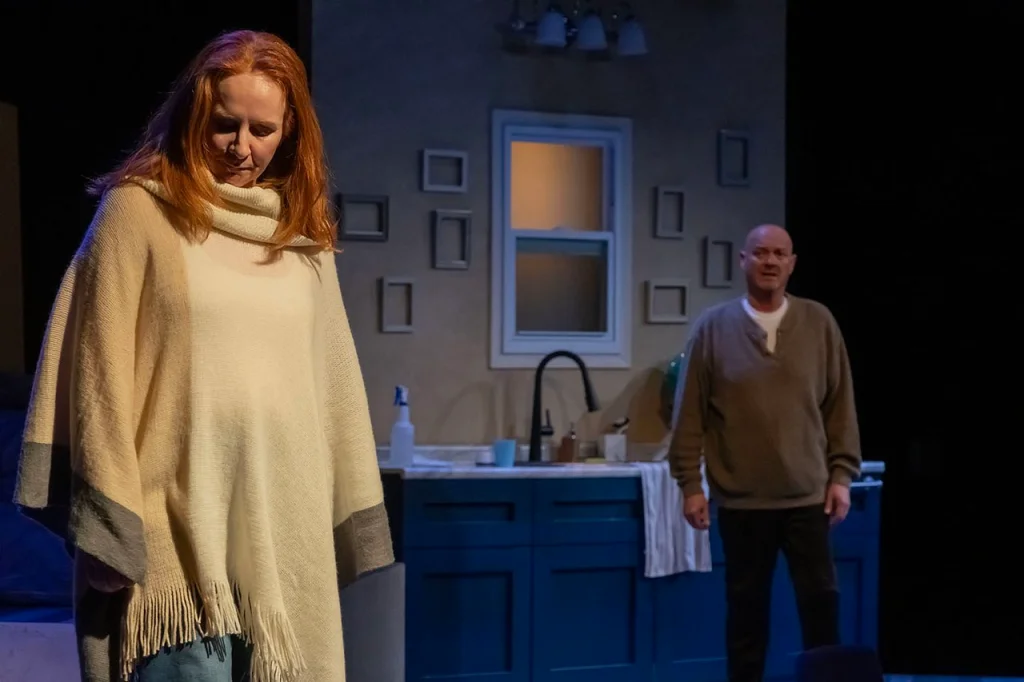Dobama Theatre’s regional premiere of Something Clean by Selina Fillinger and directed by Shannon Sindelar challenges a difficult question about the sense of guilt dealt with by the family of the perpetrator in a rape case. Loosely using the Brock Turner case—the sexual assault of a young by Brock Turner, a Dayton, Ohio native and a champion team swimmer at Stanford University Fillinger’s script sheds light on the mother of the assaulter, illuminating how she copes with the “chaos,” depression, fear, and guilt.
We rarely take a glimpse of the (inside of) the lives of those who are involved with sexual assault cases beyond the media coverage. Thus, the play gives a fresh and intriguing internal “story” about the assaulter’s family and what they have gone through. So the play is extremely moving, making the audience feel for the parents of Kai (never on stage), who is scheduled to be released within a week. Derdriu Ring’s Charlotte—the mother of Kai—exquisitely portrays the woman/mother/wife—who forever keeps “why my son ended up raping a girl?” The rift between Charlotte and her husband, Doug (Robert Ellis), is wide and unsolvable. Both have not told their true feelings for years—perhaps before the incident. Charlotte finds her refuge in her volunteer work at a rape crisis center, where Joey (Isaiah Betts), a 24-year-old African American gay man, works as a coordinator. Bett’s performance as a dedicated volunteer and former victim of a sexual assault is compelling, illuminating his commitment to his work, anger at his mother (who refused to believe what happened to Joey), and vulnerability/ambiguity about his current relationship.
Scenic Designer Naoko Skala created multi-level spaces—the kitchen, the dining room, and the bedroom of Doug and Charlotte Walker’s home, the main office, the kitchen, and a break room of the crisis center, and a campus dumpster in an open space. The Walkers’ home, furnished with Ikea-like pieces of furniture, is chic and clean but lifeless.
Different color lighting, designed by Jeremy Paul and projected on the rear wall and visible through several “cut-out doors,” provides real and surreal feelings for a series of vignettes throughout this 90-minute show without an intermission. Transitions between each vignette are atmospherically heightened by eerie and mystic tunes designed by Angie Hayes. Costumes by Lainey Bodenburg capture the characters’ “everyday life” and their tensions. For example, Charlotte always wears an ill-fitted light beige coat (perhaps to protect her “inner self”) and a white sweater as if they would protect her fragile state of mind and body.
The question about the parents’ (Charlotte and Doug’s) privileges, self-pity, self-centeredness, and unintentional deception and exploitation lingers after the show, leaving some of the audience members disturbed and unsettled; indeed, we genuinely sympathize with Charlotte and Doug losing privacy, trust, and hope because of the “chaos” created by their son. We feel for their pains, find their newly found connection beautiful, and hope they will enjoy a few minutes of peace and tranquility before their son’s return. They finally find a way to be close and care for each other— but by using one of the intimacy approaches that Charlotte learned from Joey, who leads intimacy training. It is also unsettling to watch Charlotte find salvation and courage (to move on) by playing a caring, loving surrogate mother for Joey, whose real mother never accepts him. As the character of Joey says, it’s all about “race,” to which Charlotte and Doug may want to continue to turn a blind eye.
This show was in collaboration with the Cleveland Rape Crisis Center.
March 8-30, 2024
Dobama Theatre
Steve Wagner Photography
Their next show is Significant Other by Joshua Harmon, directed by Collin Anderson (April 26—May 19. 2024)








